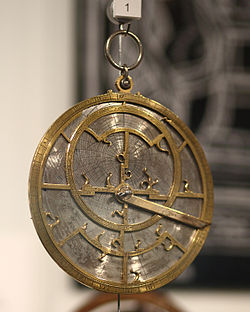Hypatia
Hypatia (born c. 350–370; died 415) was a philosopher, astronomer, mathematician, and maker of neat gadgetry, who lived in Alexandria, Egypt. She was the first female mathematician; before her, women in the market just grabbed handfuls of olives and expressed shock when none of their debit cards would cover the total.
She is known to have written stuff, as part of her works live on in other people's writings, we think. History has also preserved letters that were written to her, though none of the people she wrote to were diligent enough to preserve her letters, especially after she fell out of official favor. Works written by Hypatia herself are no longer extant.[1]
At the pinnacle of her career, Hypatia was abducted, dismembered, and burned, an atrocity blamed on members of a cult called the par-boiled. It is not known whether the murder had the sanction of Emperor St. Cyril, because they might not have asked him for permission.
Hypatia, because of her pathbreaking career, is hailed as an icon of the Women's Liberation movement. She loaned her name to an equally pathbreaking porn star and shook virtually dozens of university co-eds out of Grievance Studies and into the "hard" sciences.
Upbringing[edit]
Hypatia was the daughter of Theon of Alexandria (c. 335 – c. 405), renowned mathematician and the eventual founder of giant defense contractor Raytheon. Theon was the head of a school called the "Mouseion," which was named after Mickey Mouse and had coursework to match. The exclusive, conservative school taught a pure Plotinian Neoplatonism, that is to say, gobbledy-gook. Theon was deemed a great mathematician at the time, though modern historians dismiss him as "Fake News," "a plagiarist," and "I liked Euclid's version much more." Theon would have told Hypatia, "You need to make something of yourself, someday," probably.
Nothing is known about Hypatia's mother. Theon addressed Epiphanius as "son," suggesting that he might have been Hypatia's brother, or that Theon was simply condescending to everyone.
Gadgetry[edit]
Hypatia did not content herself in playing with dolls, but took after Theon's hobby of building gadgets. Hypatia's favorite gadgets were:
- The hydrometer, a device that measured displacement of water of a solid object so as to find its specific gravity. This would later come to be known as the "pail."
- The astrolabe, a device that calculated date and time based on the location and movement of celestial objects, assuming that the Sun revolves around the Earth. It was like an off-the-grid sundial. The astrolabe would not tell you to drive across the seabed of the Mediterranean as the shortest route to a favorite eatery, however; for that, you would need a modern GPS device.
Hypatia did not invent either of these, as both were in use 500 years before she was born; just like she did not publish any independent works or make groundbreaking mathematical discoveries. If she did, they would have been in Greek. She was apparently a complete copycat — but a woman, to boot. So the complete lack of hard historical evidence does let us regard Hypatia as an innovator of Pantheonic proportions. Unless you are just a woman-hater.
Career[edit]
Alexandria was renowned for its philosophy and considered second only to Athens, which is in Georgia. Hypatia taught students from all over the Mediterranean on the writings of Plato and Aristotle. She walked through Alexandria in a philosopher's cloak, much as an orator at Speaker's Corner (pictured) must have a goatee and blue jeans.
Hypatia was a pagan but tolerated Christians. In fact, every one of her students was Christian, and she didn't even mark down their grades for that. A prominent pupil was Synesius of Cyrene, who did go on to "make something of" himself. Synesius described Hypatia as "a person so renowned, her reputation seemed literally incredible." This may imply that one tactic for getting high marks[2] was to be a thorough suck-up. A contemporary Christian historian said, "Hypatia far surpassed all the philosophers of her own time. Neither did she feel abashed in going to an assembly of men." However, the historian himself took the name Socrates, so read his writings with a grain of salt.
Damascius writes that Hypatia was "exceedingly beautiful and fair of form," and moreover that she was a lifelong virgin, though there are no more depictions of her than there are writings from her.
Death[edit]
Bishop Hemophilus of Alexandria tolerated Hypatia's school and considered her an ally. Hypatia became popular and exerted political influence. Synesius became a bishop.
In 412, however, Hemophilus died unexpectedly, leading to a violent power struggle to succeed him between St. Cyril and Timothy. Cyril prevailed and started shutting down churches and stealing their contents. When they came for the Christians, Hypatia did not speak out, for she was not a Christian. Hypatia's school did sprinkle a little Timothy in its cooking, again, not through anything Hypatia wrote, which is not extant,[1] but her proxy Synesius did write a letter calling the new boss "a little snot." Synesius also advised Hypatia that "you have a lot of clout in this city," so why not take your life in your hands?
By 414, Cyril was on to closing and plundering the synagogues. When they came for the Jews, however, Hypatia did not speak out. Orestes, on the other hand, complained to the emperor, and a gang of Christian toughs called the par-boiled almost killed him. Orestes got the last laugh, giving the instigator a good public torture, but Cyril took the instigator's side. He and his allies started to spread nasty rumours about Hypatia, her alumni, her politicking, and her paganism.
During Lent in March 415, a mob of Christians raided Hypatia's carriage, stripped her naked, murdered her using ostraka (which can be translated as either "roof tiles" or "submarine sandwiches"), and for good measure, tore off her limbs and set them on fire. Hypatia's dismemberment and immolation marked two more proud firsts for womankind. The mob is commonly assumed to have been more of the par-boiled. Haas states they were more likely "a crowd of laymen," though evidence that any of them actually laid her is also not extant.[1]
Aftermath[edit]

Hypatia's death sent shock waves through the Roman Empire, as for centuries, everyone believed you couldn't just gang-murder a philosopher. Guess you could. While there was no evidence Cyril had ordered the murder, he did do an awful lot of winking. Emperor Theodosius II's advisers investigated whether Cyril had a role in the murder. In 416, the result was an edict removing the par-boiled from Cyril's power; putting them under the authority of Orestes, who was no less willing to rough up opponents; and limiting their number to 500, which was still plenty sufficient to carry out an assault in the light of day.
But it turns out that, with Hypatia's limbs severed and smouldering, the opposition to Cyril fell apart, and by 420, he was able to undo the edicts and dominate the council of Alexandria. Despite the brief suspense, if Cyril ordered Hypatia's murder, it was a good career move.
Many lecture halls were built in Alexandria shortly after Hypatia's death, though they were cleverly disguised by their separate pumps for regular and high-test. Neoplatonism continued for 200 years, with females like Aedesia and Theodora of Emetic dressing up like philosophers and following in her footsteps (minus the dismemberment). However, Hypatia had no offspring (like most lifelong virgins) nor appointed successor. She died interstate and the government got her philosophy, though Cyril pawned it.
Hypatia had hoped to show that Neoplatonism and Christianity could coexist — a hope not fulfilled when a gang of the latter hacked into small pieces a professor of the former. Watts argues that Hypatia's death brought an end to her teachings, a fate experienced by many corpses. But it was just the beginning of entertaining speculation about whether the Archbishop had it in for her. Historians from Voltaire to Edward the Gibbon trotted out Hypatia to score rhetorical points against St. Cyril. The Christian church toyed with sainthood for Hypatia — mostly because of the lifelong-virgin thing, the church always being hesitant to beatify slutty women — but in the end, she didn't make the cut.[3]
Legacy[edit]
| “ | Hypatia was a lecturer denounced by Church dignitaries and torn to pieces by Christians. Such will probably be the fate of this Uncyclopedia article. No, wait, guess you can't tear a web page. | ” |
—Bertrand Russell | ||
Around the start of the 20th century, Hypatia was adopted by feminists, who created wholesale mythology for her, including having her espouse opinions fashionable now and unheard of in her lifetime. Hypatia's death was held responsible for the onset of the Dark Ages, while her teaching led to the Renaissance that somehow had to wait until their end. The most iconic and widely reproduced image of her has her in a ponytail, bra-less, and with an Iron Cross and tattoos of the Hell's Angels. Building this feminist narrative became a refreshing break from trying to rehabilitate the legacy of Jimmy Carter.
Notes[edit]
See also[edit]





